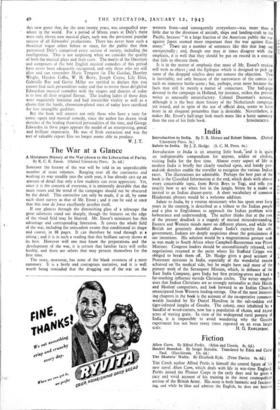A Miniature History of the War (down to the Liberation
of Paris). By R. C. K. Ensor. (Oxford University Press. 2s. 6d.)
The War at a Glance
A Miniature History of the War (down to the Liberation of Paris). By R. C. K. Ensor. (Oxford University Press. 2s. 6d.) SOMEDAY the history of the war will be told in an unpredictable number of stout volumes. Ranging over all the continents and working its way steadily into the sixth year, it has already cast up an amount of detail that only a few students can even appreciate. Yet, since it is the concern of everyone, it is eminently desirable that the main issues and the trend of the campaigns should not be obscured by the detail. This corrective can only be made, if at all, by some such short survey as that of Mr. Ensor ; and it can be said at once that this tour de force excellently justifies itself.
If one glances through the diminishing glass of a telescope the great saliencies stand out sharply, though the features on the edge of the visual field may be blurred. Mr. Ensor's miniature has this advantage and corresponding limitation. It covers the whole field of the war, including the antecedent events that conditioned its shape and course, in 88 pages. It can therefore be read through at a sitting ; and it is in such a reading that this brilliant survey shows at its best. However well one may know the preparations and the development of the war, it is certain that familiar facts will strike freshly, and there are others that may present themselves for the first time.
The story, moreover, has none of the blank evenness of a mere summary. It is a lively and courageous narrative, and it is well worth being reminded that the dragging out of the war on the
western front—and consequently everywhere—was more than a little due to the diversion of aircraft, ships and landing-craft to the Pacific, because " to a large fraction of the American public the Wit against Japan seemed more important than the war against Ger- many." There are a number of sentences like this that leap out unexpectedly ; and, though one may at times_ disagree with the emphasis, it is well that they should be put on record in a context that fails to obscure them.
It is in the matter of emphasis that most of Mr. Ensoes readers will wish to object =- and the Epilogue which is designed to pick up some of the dropped stitches does not remove the objection. This is inevitable, not only because of the narrowness of the canvas for such an immense battle-scene ; but, perhaps, even more because the facts may still be merely a matter of conjecture. The half-page devoted to the campaign in Holland, for instance, strikes the present writer as unusually unsatisfactory. Colonel Doorman's account, although it is the best short history of- the Netherlands campaign yet issued, and in spite of the use of official data, seems to leave more in art eloquent penumbra than is desirable. Nevertheless, it makes Mr. Ensor's half-page look much more like a hasty summary






















 Previous page
Previous page